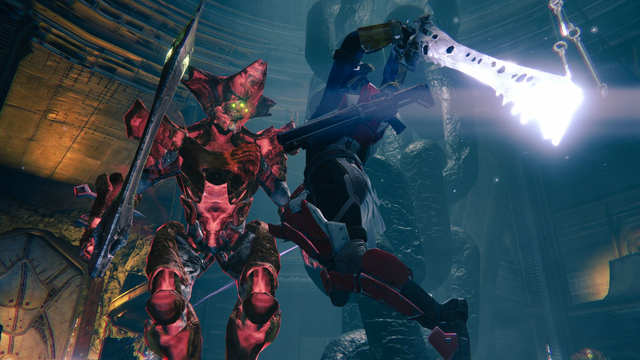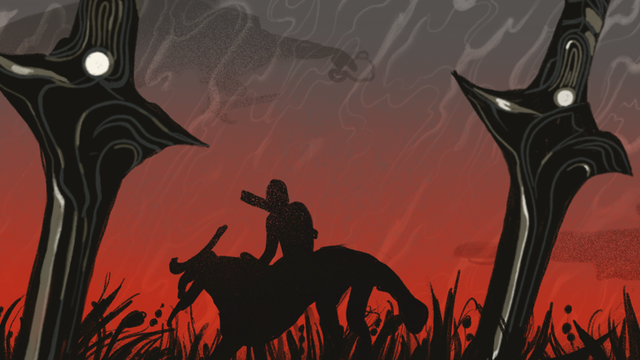I’ll be the first to admit it: I love Destiny lore. From the series’s beginning, I’ve loved digging deep into the fictional sandbox that Bungie’s writers have built. It’s a world where immortal Thanatonauts spend their moments between temporary deaths and inevitable resurrections in meditation about space magic. It’s a world where doomsaying emperors drink wine brewed from the pulverized dust of conquered planets, where every Guardian carries a gun with a name like “Kindled Orchid” or “Stochastic Variable,” where primordial universal forces slide into your DMs to rant about Nietzche before filling all your favorite skyboxes with Malevolent Triangles. It’s a beautiful, nonsense palette of space fantasy—of genres, aesthetics, and philosophies.
Yet, after spending seven years in Destiny’s world, players haven’t actually seen all that much of it. All my favorite parts of Destiny lore have barely appeared on-screen. And that’s largely due to Destiny’s protagonist problem.
With each expansion and content season, Destiny’s lore sandbox grows. But until recently, it’s been a struggle to find that work where it matters most: in the games themselves. Instead, it’s been hidden in the periphery, in spaces like the original game’s Grimoire website, or in Destiny 2’s lore tabs and storybooks, which—while in-game—are better presented elsewhere by third parties like the Ishtar Collective. Destiny’s world building has always been something encountered tangentially, more implied than seen, because the games have always placed their interest elsewhere. However fascinating Destiny’s lore becomes, its protagonist has stood in its way.
Destiny’s player character has always enjoyed a kind of weird solipsism. They aren’t just the protagonist of the universe—they’re its obsession. It’s rare that anything appears in play that doesn’t directly enable the player’s power fantasy as the Traveler’s best, most favorite space magician, to the point that Destiny’s universe feels only as wide as the Guardian’s immediate vicinity. Other characters never meaningfully engage with each other, because they exist to facilitate the Guardian. Problems only exist for the Guardian to solve, because they’re the only person allowed to solve problems. The player character occupies so much of the game’s attention that its world building could belong to a different franchise. If there’s anything happening outside the protagonist’s direct line of sight, is it even happening at all? How important can anything in this world be, if it doesn’t exist for the Guardian to act upon?

In many ways, the protagonist problem is one of structure. Destiny’s story and gameplay—in their current incarnation, at least—require every player’s Guardian to occupy the same narrative position. For the Destiny game-as-service model to function, my Guardian and yours have to share the same objectives, the same conflicts and relationships, the same mournful facial animation whenever android Nathan Fillion gets murdered. But because Destiny relies on the player having a sense of ownership over their own Guardian, there’s an inevitable friction between the needs their character has to satisfy. Any tool the player has to reflect their Guardian’s individuality, mechanically or narratively, can’t jeopardize their fictional interchangeability. To thread that needle, Destiny opts to make the protagonist an empty vessel, a negative space for the player to project their own fiction onto.
And that’s fine! I love to provide my own head-canon. I’ve spent hours deliberating over which ship paint job best reflects my Warlock’s imagined history, because I’m insufferable. But my internal fanfiction for my Guardian doesn’t translate into compelling in-game storytelling, because our Guardians aren’t really characters at all. They’re voiceless, person-shaped weapons holding the game’s fiction hostage, whose only personality traits are a passion for acquiring space guns and a strong dislike of the health bars standing in the way of acquiring those space guns. They don’t react to or engage with the world they occupy in any other way than shooting it, because they can’t. There are no dialogue trees, no decisions that matter. Destiny’s protagonist isn’t a lens for their world — they’re an empty window frame.
This issue has only grown more frustrating over Destiny’s seven years. The series has repeatedly introduced genuinely compelling ideas only to sprint in the opposite direction, to maintain its unwavering fascination with the player character — a fascination that, to the detriment of Destiny’s story, has gone unjustified. The world surrounding the protagonist stays unexplored. Characters that might have compensated for the Guardian’s lack are robbed of their potential and agency, just so they can enter the stationary purgatory of the bounty vendor. I watched with agony as Variks the Loyal—my favorite alien scribe/schemer/prison warden/bloodsport officiator—returned from three years off-screen, just so that he can chitter a couple lines at me before selling a quest to shoot 15 robots or whatever, forever.
It’s unjust. But thankfully, it’s finally beginning to change. Destiny 2’s storytelling in its most recent seasons is the best the series has produced, thanks to a simple fix: the game is giving less of a shit about its protagonist.

In the Season of the Chosen and the Season of the Splicer, the narrative spotlight is shifting away from whatever space the Guardian occupies. Where lore and world building had been detached, neglected flavoring, they’re now forming the core of the ongoing story. Fiction pulled from the periphery informs the motivations and ideologies of characters who interact with newfound agency, driving conflicts with greater depth. The people in Destiny’s universe are more concerned with each other than with us. And that’s good.
The Cabal returns to the Solar System in a new light, an engine of conquest fleeing a conquered home world. While the Cabal Empress confronts the failings of her people’s imperial legacy, humanity’s Guardians contend with their own — a new voice’s calls for empathy pitted against an old warrior’s Dark Age militance. Then, as Earth’s Last City descends into crisis beneath an Endless Night, it’s forced to seek the aid of Mithrax, leader of a new House among the alien Eliksni that humanity has only ever seen as enemies. As we work alongside Mithrax and see a new dimension of his people’s machine reverence, humanity and Eliksni weigh the mirrored, generational traumas they’ve inflicted on each other.
Destiny is finally accomplishing in-game what was always best about its external fiction, what the best speculative fiction does. It’s interrogating itself, the intentions and histories of its fictional characters, to ask very real questions. In times of crisis, how do you counter the power-hungry who wield paranoia and xenophobia as a weapon? In a world of constant conflict, what’s braver than trusting in peace?
Destiny doesn’t need my character to ask those questions. Until I’m needed to delete the health bar of whatever new proper noun is threatening the big orb in the sky, I’m happy to let Destiny’s world act on its own.


